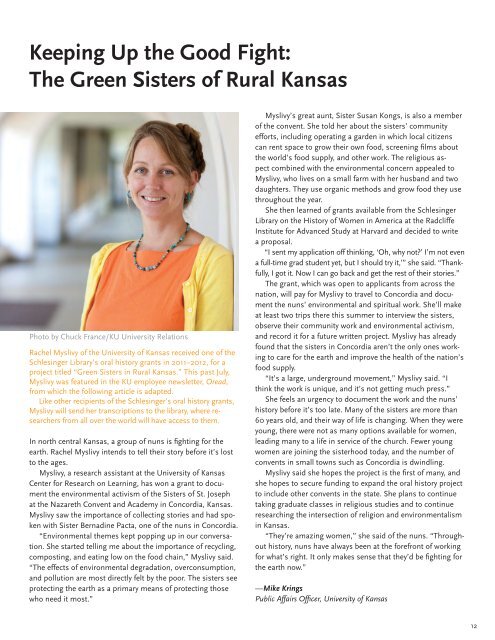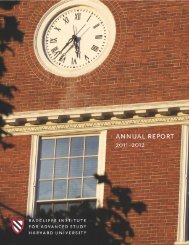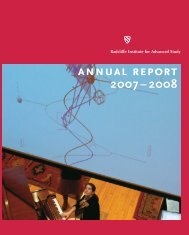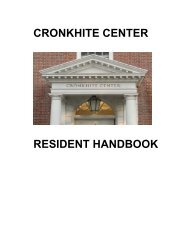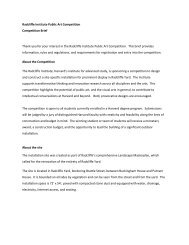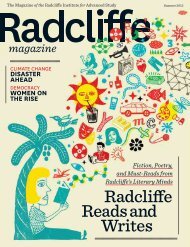schlesinger library - Radcliffe Institute for Advanced Study - Harvard ...
schlesinger library - Radcliffe Institute for Advanced Study - Harvard ...
schlesinger library - Radcliffe Institute for Advanced Study - Harvard ...
Create successful ePaper yourself
Turn your PDF publications into a flip-book with our unique Google optimized e-Paper software.
Keeping Up the Good Fight:<br />
The Green Sisters of Rural Kansas<br />
Photo by Chuck France/KU University Relations<br />
Rachel Myslivy of the University of Kansas received one of the<br />
Schlesinger Library’s oral history grants in 2011–2012, <strong>for</strong> a<br />
project titled “Green Sisters in Rural Kansas.” This past July,<br />
Myslivy was featured in the KU employee newsletter, Oread,<br />
from which the following article is adapted.<br />
Like other recipients of the Schlesinger’s oral history grants,<br />
Myslivy will send her transcriptions to the <strong>library</strong>, where researchers<br />
from all over the world will have access to them.<br />
In north central Kansas, a group of nuns is fighting <strong>for</strong> the<br />
earth. Rachel Myslivy intends to tell their story be<strong>for</strong>e it’s lost<br />
to the ages.<br />
Myslivy, a research assistant at the University of Kansas<br />
Center <strong>for</strong> Research on Learning, has won a grant to document<br />
the environmental activism of the Sisters of St. Joseph<br />
at the Nazareth Convent and Academy in Concordia, Kansas.<br />
Myslivy saw the importance of collecting stories and had spoken<br />
with Sister Bernadine Pacta, one of the nuns in Concordia.<br />
“Environmental themes kept popping up in our conversation.<br />
She started telling me about the importance of recycling,<br />
composting, and eating low on the food chain,” Myslivy said.<br />
“The effects of environmental degradation, overconsumption,<br />
and pollution are most directly felt by the poor. The sisters see<br />
protecting the earth as a primary means of protecting those<br />
who need it most.”<br />
Myslivy’s great aunt, Sister Susan Kongs, is also a member<br />
of the convent. She told her about the sisters’ community<br />
ef<strong>for</strong>ts, including operating a garden in which local citizens<br />
can rent space to grow their own food, screening films about<br />
the world’s food supply, and other work. The religious aspect<br />
combined with the environmental concern appealed to<br />
Myslivy, who lives on a small farm with her husband and two<br />
daughters. They use organic methods and grow food they use<br />
throughout the year.<br />
She then learned of grants available from the Schlesinger<br />
Library on the History of Women in America at the <strong>Radcliffe</strong><br />
<strong>Institute</strong> <strong>for</strong> <strong>Advanced</strong> <strong>Study</strong> at <strong>Harvard</strong> and decided to write<br />
a proposal.<br />
“I sent my application off thinking, ‘Oh, why not’ I’m not even<br />
a full-time grad student yet, but I should try it,’” she said. “Thankfully,<br />
I got it. Now I can go back and get the rest of their stories.”<br />
The grant, which was open to applicants from across the<br />
nation, will pay <strong>for</strong> Myslivy to travel to Concordia and document<br />
the nuns’ environmental and spiritual work. She’ll make<br />
at least two trips there this summer to interview the sisters,<br />
observe their community work and environmental activism,<br />
and record it <strong>for</strong> a future written project. Myslivy has already<br />
found that the sisters in Concordia aren’t the only ones working<br />
to care <strong>for</strong> the earth and improve the health of the nation’s<br />
food supply.<br />
“It’s a large, underground movement,” Myslivy said. “I<br />
think the work is unique, and it’s not getting much press.”<br />
She feels an urgency to document the work and the nuns’<br />
history be<strong>for</strong>e it’s too late. Many of the sisters are more than<br />
60 years old, and their way of life is changing. When they were<br />
young, there were not as many options available <strong>for</strong> women,<br />
leading many to a life in service of the church. Fewer young<br />
women are joining the sisterhood today, and the number of<br />
convents in small towns such as Concordia is dwindling.<br />
Myslivy said she hopes the project is the first of many, and<br />
she hopes to secure funding to expand the oral history project<br />
to include other convents in the state. She plans to continue<br />
taking graduate classes in religious studies and to continue<br />
researching the intersection of religion and environmentalism<br />
in Kansas.<br />
“They’re amazing women,” she said of the nuns. “Throughout<br />
history, nuns have always been at the <strong>for</strong>efront of working<br />
<strong>for</strong> what’s right. It only makes sense that they’d be fighting <strong>for</strong><br />
the earth now.”<br />
—Mike Krings<br />
Public Affairs Officer, University of Kansas<br />
12


